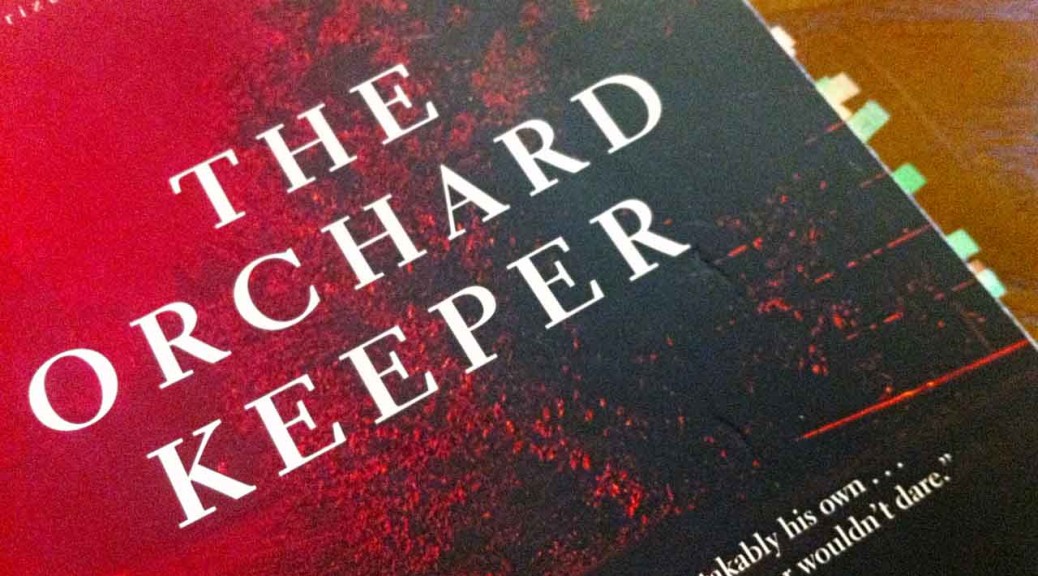McCarthy, Cormac. The Orchard Keeper. New York, N.Y.: Vintage International, 1993. Print. (First ed. 1965).
“Half blue tick and half walker.” p. 135
Talking about “being skeered of painters” 148-150.
Muskydine wine p. 150
“They sipped their wine with the solemnity of communicants, troglodytes gathered in some firelit cave. The lamp guttered in a draft of wind and their shadows, ponderous and bearlike upon the wall, weaved in unison.” p.150
“Old Bill, he backed off some, said that old she-painter might be around. Well, I was younger’n him and likely didn’t have as good sense, so in I goes and grabs the little feller up by the scruff of the neck.” p. 152
“And two days later the charred shaft of the pine tree still smoldering, pitch bubbling gently from the shell of the bark and small electricblue flames seeping and curling, the spire of smoke standing straight up in the motionless air like a continuation of the tree itself.” p. 163
“They began to unload, carrying the cases back into the garage, the car creaking and rising bit by bit until they had finished and it stood with its rear end high in the air like a cat in heat.” p. 165
“The old man watched them from his window darting and skulking among the bushes, slipping from tree to tree like boys playing Indians.” p. 185
“The old man sat very still on the floor. One shot struck the stove begind him and leaped off with an angry spang, taking the glass out of the table lamp. It was like being in a room full of invisible and malevolent spirits.” p. 186
“They went silently along over the trace of the quarry road, the sledge whispering, the gaunt dog padding, past the quarryhole with its vaporous green waters and into the woods again, the limestone white against the dark earth, a populace of monstrous slugs dormant in a carbon forest.” p. 189
“Well, Huffaker said, I couldn’t tell you offhand where-all you might find him at. He lives up yander somewheres–a random gesture at the brooding hills that cupped in the valley.” p. 196
“In the woods mists like old gray spirits paled and scattered, by moss coverlets the dark earth stirred and nightfurled wildflowers unbent their withered fronds all down the path where came the derelict hound shambling along in an aureole of its own incredibility,” p. 199
“Through a gap in the trees he could see the valley far below him where the river ran, a cauldron in the mountain’s shadow where smoke and spume seethed like the old disturbance of the earth erupting once again, black mist languidin the cuts and trenches as flowing lava and the palisades of rock rising in the high-shored rim beyond the valley,” p. 200-201
about the old man and his dog “proceeding on the weathered sun-washed bridge, jaunty and yet sad, like maimed soldiers returning.” p. 202
cat being prey to an owl 216-217
“When she left the rocks, was clear of the overreaching branches of the tree, there grew about her a shadow in the darkness like pooled ink spreading, a soft-hissing feathered sound which ceased even as she half turned, saw unbelieving the immense span of wings cupped downward, turned again, already squalling when the owl struck her back like a falling rock.” p. 217
“Cats is smart, allowed the old man. Course it could of been a common everyday housecat. They’ll tear up anything they come up on, a cat will. Housecats is smart too. Smarter’n a dog or a mule. Folks thinks they ain’t on account of you cain’t learn em nothin, but what it is is that they won’t learn nothin. They too smart.” p. 227
“The sun broke through the final shelf of clouds and bathed for a moment the dripping trees with blood, tinted the stones a diaphanous wash of color, as if the very air had gone to wine.” p. 246
“They are gone now. Fled, banished in death or exile, lost, undone. Over the land sun and wind still move to burn and sway the trees, the grasses. No avatar, no scion, no vestige of that people remains. On the lips of the strange race that now dwells there their names are myth, legend, dust.” p. 246
